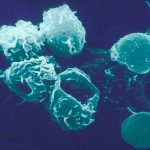Link to Pubmed [PMID] – 10946274
J. Immunol. 2000 Sep;165(5):2481-90
NKT cells are a subset of T lymphocytes that is mainly restricted by the nonclassical MHC class I molecule, CD1d, and that includes several subpopulations, in particular CD4+ and CD4-CD8- (DN) cells. In the mouse, differential distribution of these subpopulations as well as heterogeneity in the expression of various markers as a function of tissue localization have been reported. We have thus undertaken a detailed study of the DN NKT cell subpopulation. With a highly sensitive semiquantitative RT-PCR technique, its TCR repertoire was characterized in various tissues. We found that mouse DN NKT cells are a variable mixture of two subgroups, one bearing the invariant Valpha14 chain paired to rearranged Vbeta2, Vbeta7, Vbeta8.1, Vbeta8.2, or Vbeta8.3 beta-chains and the other exhibiting unskewed alpha- and beta-chains. The proportion of these subgroups varies from about 100:0 in thymus, 80:20 in liver, and 50:50 in spleen to 20:80% in bone marrow, respectively. Finally, further heterogeneity in the tissue-derived DN NKT cells was discovered by sequencing extensively Vbeta8.2-Jbeta2.5 rearrangements in individual mice. Despite a few recurrences in TCR sequences, we found that each population exhibits its own and broad TCRbeta diversity.

